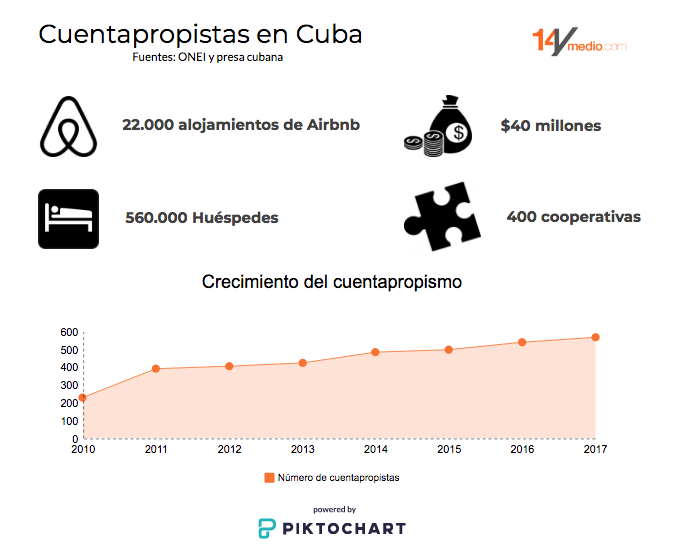
![]() 14ymedio, Mario J. Pentón, 20 March 2018 — Marta Elisa Deus is only 30 years old and has started three businesses in Cuba. This young Havanan, who lived in Spain for more than a decade, returned to the island “all fired up” to innovate and revolutionize the business world, taking advantage of the timid reforms undertaken by Raúl Castro in 2011 to open the economy to private capital.
14ymedio, Mario J. Pentón, 20 March 2018 — Marta Elisa Deus is only 30 years old and has started three businesses in Cuba. This young Havanan, who lived in Spain for more than a decade, returned to the island “all fired up” to innovate and revolutionize the business world, taking advantage of the timid reforms undertaken by Raúl Castro in 2011 to open the economy to private capital.
Deus’s main concerns now are the pause in the granting of self-employment licenses and the worsening of the business environment for the self-employed on the Island, but she is not giving up in her attempt to help create a community of small entrepreneurs that stimulates the national economy.
“I always wanted to go back to Cuba and do some work there,” she tells 14ymedio on a recent trip to Miami. In 2013 she made the decision to return to the Island to set up an accounting business. “I talked to a good friend, Irina García, who is a lawyer, and we started the business under the license for bookkeepers, or, and it’s the same thing, accountants,” she says.
The opening to the private sector and the announcement of the normalization of relations between the United States and Cuba, which faced off for more than five decades, made her think that the thaw in relations between the countries was irreversible. Cuba became fashionable and an avalanche of tourists flooded the streets, which opened up endless business possibilities.
“At the beginning it was very difficult because in Cuba there was no culture of keeping account books, people opened paladares (private restaurants) and lodging houses, but not accountant offices,” she says. During her company’s start-up they did many jobs for free to make customers see the importance of their function. Deus Accountants, the company she created, became over time a key business for those who keep business accounts in Cuba and today has a team of five employees and more than 20 collaborators.

Deus remembers that initial time with fondness, especially the dream awakened among entrepreneurs by the thaw. “During the Obama era in Cuba there was hope, but that’s over,” she says.
Barack Obama visited the island in March 2016, marking a milestone in the history of relations between both countries. The American president met with entrepreneurs and promised support to empower the Cuban people, something that annoyed the Plaza of the Revolution. For Deus, Obama’s visit marked a before and after in the way in which the government viewed self-employment.
“After Obama’s visit, everything changed, and the way the official press referred to the self-employed was no longer positive. Among entrepreneurs there began to be an atmosphere of uncertainty, because nobody was clear about where the reforms were going and what they were doing and they feared for their business,” explains Deus.
In August 2017 the Government announced the freezing of the granting of licenses for more than 20 self-employment activities, of the 200 that existed. Although officials said it was a pause to “perfect and consolidate” small businesses, many fear that it is a turnaround.
Marino Murillo, the former minister of economy who is in charge of the reform process (which the government calls ‘guidelines’), said that more errors had been generated than virtues when tackling the changes. Murillo announced that they would eliminate the ability to have more than one license to perform self-employment, that the permits would only allow work within the province in which they are requested, and that the approved activities would be reduced, from 201 to 122 .
“I worry that you can only have a license for one activity,” says Deus, who discovered in the mismanagement of Correos de Cuba (Cuban Postal Service) a niche market and created, under the license for messenger services, Mandao Express, a small company whose business is sending documents and parcels instantly. “When you have your own business, you make an effort to move it forward, and on December 31 I myself delivered food until nine o’clock at night,” she explains.
“Mandao Express was a necessity, and many times we wanted to send the documents we processed to our clients and we did not have anyone to do it for us, so as of 2016 we do it with our own company,” she explains.
“I think the State does not see self-employment as we see it, as something positive, which is good for the country,” she says. From her point of view, the law should be more proactive and instead of limiting the exercise of entrepreneurship to the currently defined 122 licenses, establish a structure for each entrepreneur to create a business where she discovers a need.
For Deus, the Cuban state would have had to invest millions in creating the more than 550,000 jobs that self-employed workers have created with practically no support. The businesswoman also points out that the contribution of this sector to the national economy is vital. In municipalities such as Trinidad, the contribution of the private sector to the treasury exceeds that of state companies.
“I would love to see self-employment as a real option so that our young people do not have to emigrate in search of opportunities, for there to be wholesale markets so we can avoid the black market, with laws for small and medium enterprises that recognize us as entities and not as ’natural persons’,” she says.
An assiduous reader of the weekly magazines The Economist and Forbes, Deus realized that in Cuba there was not enough literature dedicated to business. That’s why she decided to create Negolution, a Cuban digital magazine focused on that sector.
“Negolution came up at the end of 2016. We combine the words evolution, revolution, solution, with negocios (businesses), and that’s how the name was born. In each issue, we publish inspiring stories of small businesses on the island and give advice so that entrepreneurs can move forward with their business,” says Deus.
Negolution is distributed through the weekly packet. Deus says that on the website the latest edition has had more than 15,000 downloads.
“We received a lot of feedback from our readers, and our mail is always full of messages of support and collaboration,” says Deus, who is proud that her magazine’s digital portal was designed as a free gift from one of the readers.
Deus and Oniel Díaz, another entrepreneur from the island, sent a letter to the authorities expressing their concern about the situation of self-employment on the island. Officials from the Ministry of Labor and Social Security responded to the letter with a meeting in which they discussed issues such as the commercial import permit, the need to maintain spaces for dialogue, and wholesale markets. The authorities assured Deus that the freezing of licenses was a “temporary” thing.
Despite the dialogue with the authorities, Deus believes that self-employment on the island is looked on badly by the authorities.
“There was a group of people who were doing a lot of work in tourism and that has fallen off,” she says. The setback in the reestablishment of relations with the United States has meant the loss of thousands of tourists who were arriving from that country, a strong blow for those renting rooms and houses to tourists and to the paladares, the most lucrative activities within the private sector.
______________________
The 14ymedio team is committed to serious journalism that reflects the reality of deep Cuba. Thank you for joining us on this long road. We invite you to continue supporting us, but this time by becoming a member of 14ymedio. Together we can continue to transform journalism in Cuba.
